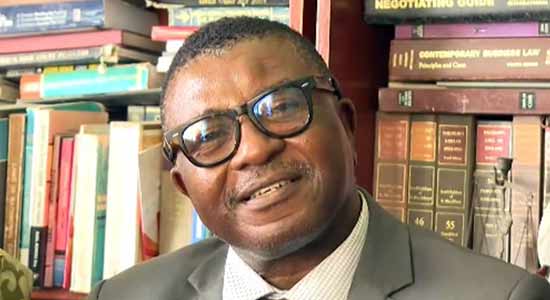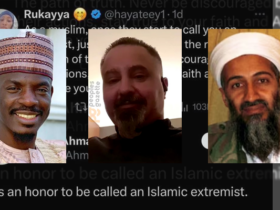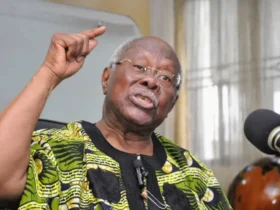
Representatives of the Civil Society of Nigeria have voiced their strong disapproval of the impending agreement between the European Union and the Africa, Caribbean, and Pacific Group of States (LGBTQ), scheduled to have been signed on November 15, 2023.
November 15, 2023, was the day set aside by the European Union (EU) to coax African, Caribbean, and Pacific (ACP) countries into signing the deceptively and euphemistically crafted LGBTQ agreement between the EU and ACP countries.
According to a report by Arise TV, Chairman of the Human Rights Committee, Sonnie Ekwowusi, explained the potential repercussions of endorsing such an agreement by the Bola Tinubu led government.
Ekwowusi noted that the deal contains provisions that clash with the nation’s philosophical, communal, and religious values, raising concerns among its citizens.
He further asserted that the agreement’s acceptance would discreetly introduce LGBTQ perspectives into the fabric of Nigerian society. He pointed out that the treaty lacks provisions for thorough scrutiny by parliamentarians, raising questions about the transparency and accountability of the proposed partnership.
He said, “Two weeks ago, we heard that they were going to sign this agreement on November 15, 2023 and we’re wondering what has happened. Even Nigerian parliamentarians who were there vowed not to sign. But now they’ve agreed to sign it on November 15. And we are saying this cannot go because LGBTQ is illegal in Nigeria.
READ ALSO: TikTok Removes Four Million Videos in Compliance with EU’s Digital Services Act
“There’s what we call the Same-Sex Prohibition Act 2014, which was enacted during the administration of Goodluck Jonathan. And that law is still there. Why should we now go ahead and sign a document that has to do with the promotion of LGBTQ? It is completely unacceptable and Nigerians should say no. Namibia has said no. Namibia is not going to sign. Ghana has also said it’s not going to sign. So, why will Nigeria sign it?”
Background and implications of signing the agreement
You are likely aware of the ongoing discussions between the European Union (EU) and ACP (African, Caribbean, and Pacific) parliamentarians regarding the controversial LGBT agreement.
According to Vanguard, in recent months, multiple meetings have taken place, including a significant one on November 28, 2022, in Brussels, where the EU aimed to exert pressure on ACP Ministers to encourage ACP heads of government to sign the contentious LGBT agreement. Another meeting with a similar objective occurred from June 19 to 28, 2023, also in Brussels, resulting in a deadlock as ACP leaders vehemently opposed signing the agreement.
Despite these setbacks, it is surprising to learn that November 15 has been designated for the signing of the controversial LGBT agreement.
This raises crucial questions about whether ACP heads of government have changed their earlier stance on the matter and agreed to sign the agreement.
So, why? Did African leaders consult their parliaments and citizens before making this decision? Furthermore, the lack of coverage of the LGBT negotiations between the EU and ACP countries in African media since 2021 is puzzling.
It is alarming that if ACP governments succumb to EU pressure and sign the agreement, it could have detrimental effects on their countries.
The agreement is perceived as an attempt to impose the EU’s LGBT agenda on ACP nations, potentially overriding their constitutions and national sovereignties.
Unlike the Monroe Doctrine, Nigeria follows the dualist doctrine under international law, meaning a treaty signed by Nigerian leaders only becomes law after ratification and domestication by the National Assembly.
The carefully worded LGBT agreement, however, threatens to automatically supersede domestic laws in ACP countries, establishing LGBT norms as the new law. This has sparked concerns about the erosion of cultural values and the imposition of foreign ideals on ACP nations.
The argument against the agreement includes a critique of the West’s promotion of practices deemed culturally incompatible with African values. The writer expresses disbelief at the elevation of certain sexual acts to civilizational values and criticizes the West for attempting to influence ACP countries to adopt these practices.
Highlighting the stance of influential figures such as U.S. President Joe Biden, who has made LGBTQ rights a focal point of American foreign policy, the writer emphasizes the importance of preserving cultural identity and values.
The call is for ACP countries to resist external pressure, asserting their sovereignty and refusing to sign the agreement on November 15 or any other time.
The message underscores the belief that ACP nations should not compromise their cultural values and traditions in the face of external influence, emphasizing the need to preserve their unique identities.
Tag: LGBTQ, Tinubu, LGBTQ agreement,







Leave a Reply